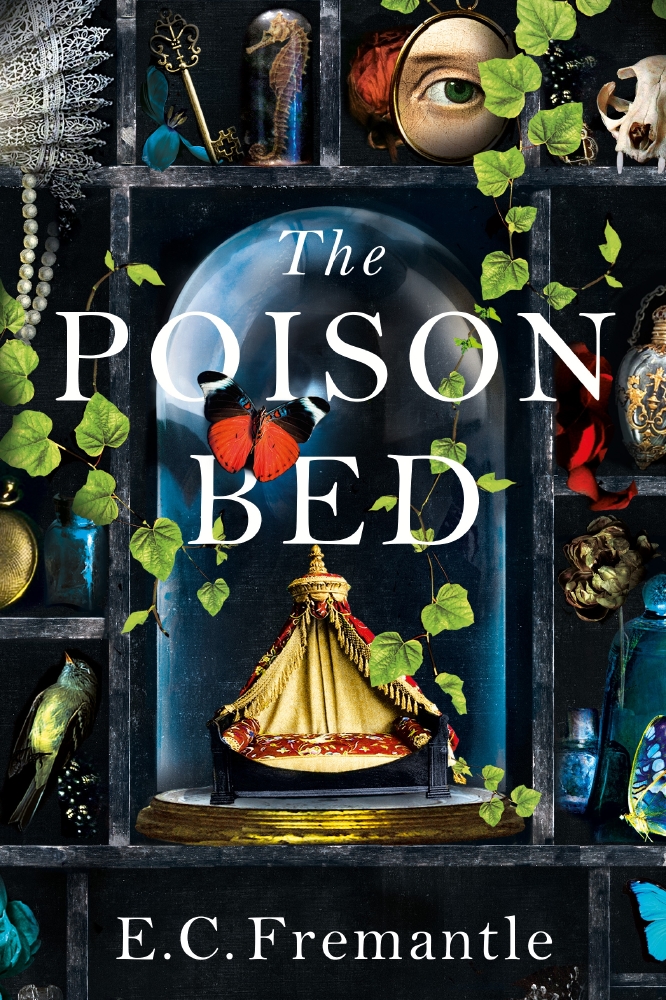The Poison Bed is very dark, full of twisty intrigue, murder and lies, set against the backdrop of the Jacobean court with all its ambition and glamour. Told from the perspective of a husband and wife – celebrities of their day – both under suspicion of poisoning, the story unfolds revealing the power games behind their marriage and lengths they are prepared to go to feed their obsessive love. It is more sinister and suspenseful than my previous novels, which is the reason it is being published under the name EC Fremantle rather than Elizabeth.

E.C. Freemantle By Jp Mesclet
Please tell us about your inspiration for the novel.
It is based on a true story. A man was poisoned in the Tower of London in 1613. A woman confessed to the crime. I became fascinated by this woman, her marriage, the scandalous divorce behind it and why she might have done such a thing. As I began to research the story, I came to see that nothing was as clear-cut as it first seemed and that it was possible that she was the tool of a far wider scheme of power play. The story, ripped, as it was, straight from the headlines, seemed to chime with modern day scandals and I was impelled to write a thriller to explore this.
What is a typical day like in your writing world?
I tend to do a good deal of faffing around in the mornings, correspondence, dog walking, falling into Google search holes. I also read in the early mornings. If I save it for the evening I fall asleep after about sixty seconds, which doesn’t work at all, particularly as I am judging a book prize at the moment and so I have a mountainous to-be-read pile. At about midday I get down to writing and then usually keep working until about 7 or 8pm.
What are your ideal writing conditions?
I’ve recently semi moved to Norfolk, where the peace and quiet helps me focus. I am most definitely not a coffee shop author. I’m too easily distracted.
What do you do for inspiration when the words are struggling to flow?
I simply force myself to write through any blocks and don’t take any excuses. I find discipline is key to the process and if I keep my output to 1500 words a day, no matter what, it usually works. Sometimes that means writing a load of drivel that all needs to be cut on the following day. I also find that walking helps half-formed ideas to take shape. I can be found most mornings striding about the countryside babbling in the voices of my characters. Luckily there are not many people about, as I probably look a bit bonkers.
What are you reading right now?
I mentioned the book prize, so imagine a teetering stack of about eighty historical novels of all imaginable varieties. That is what I am reading. But I’m sneaking in Lucy Atkins’ compulsively gripping The Night Visitor in between times. I love a good psychological thriller.
Who have been your greatest literary influences over the years?
That’s very hard to answer but Daphne du Maurier is one and Patricia Highsmith another. Stylistically they are completely different but they both create suspense with exceptional deftness. Thomas Hardy’s Tess is one of my favourite novels to turn to for inspiration and I read Conrad for his sheer linguistic brilliance.
If you could offer one piece of advice to aspiring authors what would it be?
Read, always, and widely!
What do you consider to be the most poisonous thing that plagues today’s society?
Something that troubles me profoundly is the idea that we live in a ‘post truth’ world. It is an anxiety I address in The Poison Bed. Writing about historical events is, I find, a good way to articulate some of the apprehensions of the moment.
What is next for you?
I am working on another Jacobean set thriller to be published next year. It is a story of revenge, also based on true events, called The Honey and the Sting.


